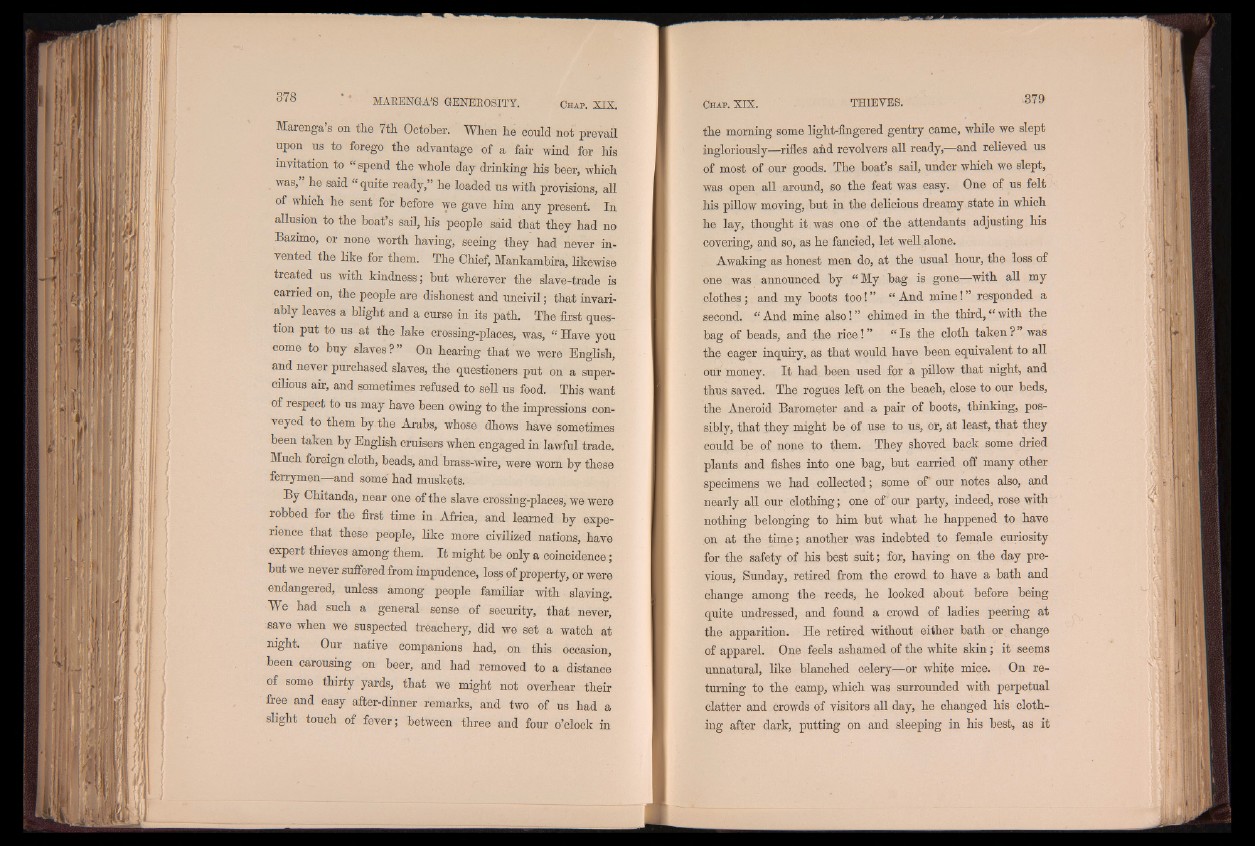
Marenga’s on the 7th October. When he could not prevail
upon us to forego the advantage of a fair wind for his
invitation to “ spend the whole day drinking his beer, which
was, he said “ quite ready,” he loaded us with provisions, all
of which he sent for before we gave him any present. In
allusion to the boat’s sail, his people said that they had no
Bazimo, or none worth having, seeing they had never invented
the like for them. The Chief, Mankambira, likewise
treated us with kindness; but wherever the slave-trade is
carried on, the people are dishonest and uncivil; that invariably
leaves a blight and a curse in its path. The first question
put to us at the lake crossing-places, was, “ Have you
come to buy slaves?” On hearing that we were TWhah,
and never purchased slaves, the questioners put on a supercilious
air, and sometimes refused to sell us food. This want
of respect to us may have been owing to the impressions conveyed
to them by the Arabs, whose dhows have sometimes
been taken by English cruisers when engaged in lawful trade.
Much foreign cloth, beads, and brass-wire, were worn by these
ferrymen—and some had muskets.
By Chitanda, near one of the slave crossing-places, we were
robbed for the first time in Africa, and learned by experience
that these people, like more civilized nations, have
expert thieves among them. I t might be only a coincidence;
but we never suffered from impudence, loss of property, or were
endangered, unless among people familiar with slaving.
We had such a general sense of security, that never,
save when we suspected treachery, did we set a watch at
night. Our native companions had, on this occasion,
been carousing on beer, and had removed to a distance
of some thirty yards, that we might not overhear their
free and easy after-dinner remarks, and two of us had a
slight touch of fever; between three and four o’clock in
the morning some light-fingered gentry came, while we slept
ingloriously—rifles ahd revolvers all ready,—and relieved us
of most of our goods. The boat’s sail, under which we slept,
was open all around, so the feat was easy. One of us felt
his pillow moving, but in the delicious dreamy state in which
he lay, thought it was one of the attendants adjusting his
covering, and so, as he fancied, let well alone.
Awaking as honest men do, at the usual hour, the loss of
one was announced by “ My bag is gone—with all my
clothes ; and my boots too! ” “ And mine! ” responded a
second. “ And mine also! ” chimed in the third, “ with the
bag of beads, and the rice! ” “ Is the cloth taken ? ’ was
the eager inquiry, as that would have been equivalent to all
our money. I t had been used for a pillow that night, and
thus saved. The rogues left on the beach, close to our beds,
the Aneroid Barometer and a pair of boots, thinking, possibly,
that they might be of use to us, or, at least, that they
could be of none to them. They shoved back some dried
plants and fishes into one bag, but carried off many other
specimens we had collected; some of our notes also, and
nearly all our clothing; one of' our party, indeed, rose with
nothing belonging to him but what he happened to have
on at the time; another was indebted to female curiosity
for the safety of his best suit; for, having on the day previous,
Sunday, retired from the crowd to have a bath and
change among the reeds, he looked about before being
quite undressed, and found a crowd of ladies peering at
the apparition. He retired without either bath or change
of apparel. One feels ashamed of the white skin; it seems
unnatural, like blanched celery—or white mice. On returning
to the camp, which was surrounded with perpetual
clatter and crowds of visitors all day, he changed his clothing
after dark, putting on and sleeping in his best, as it